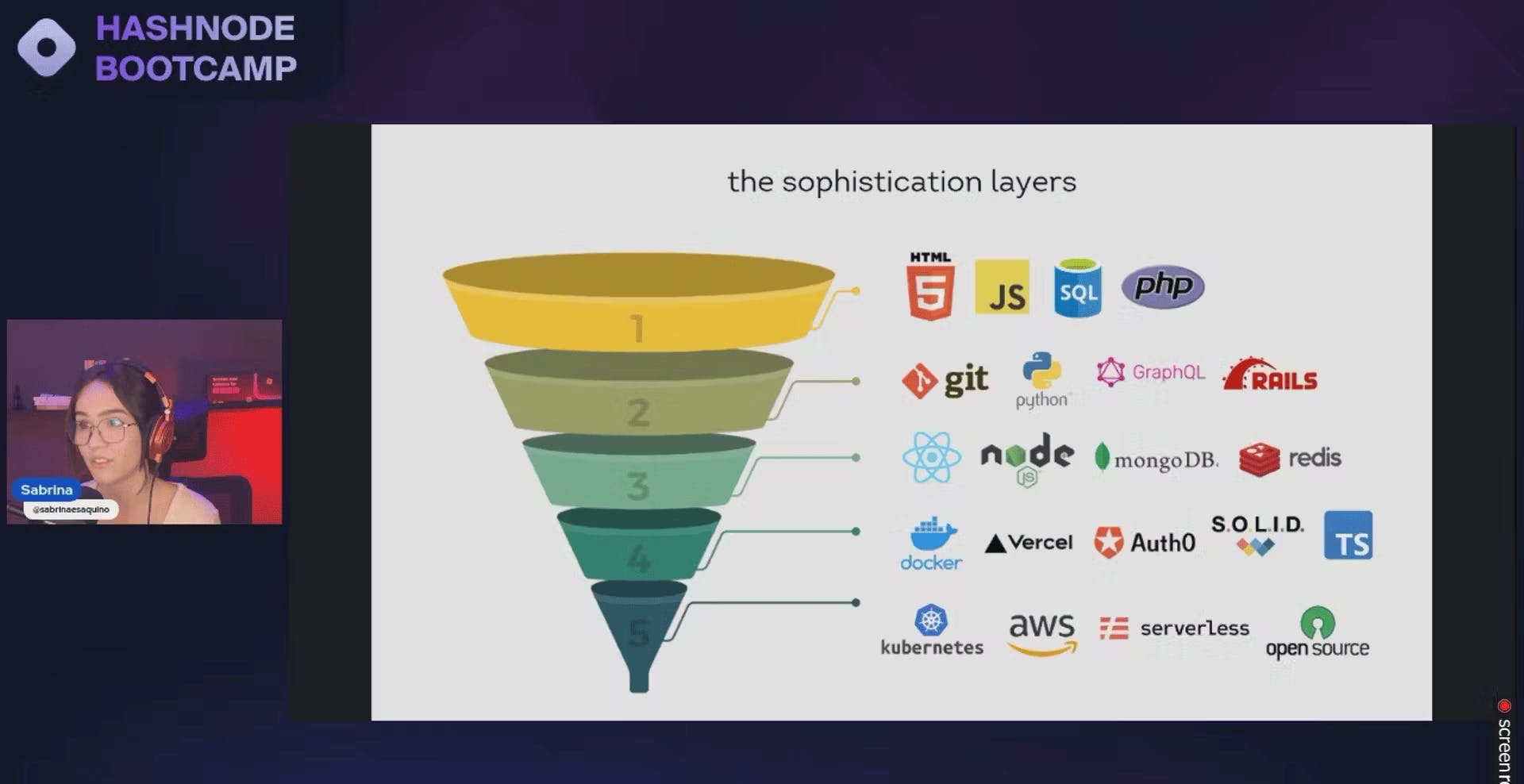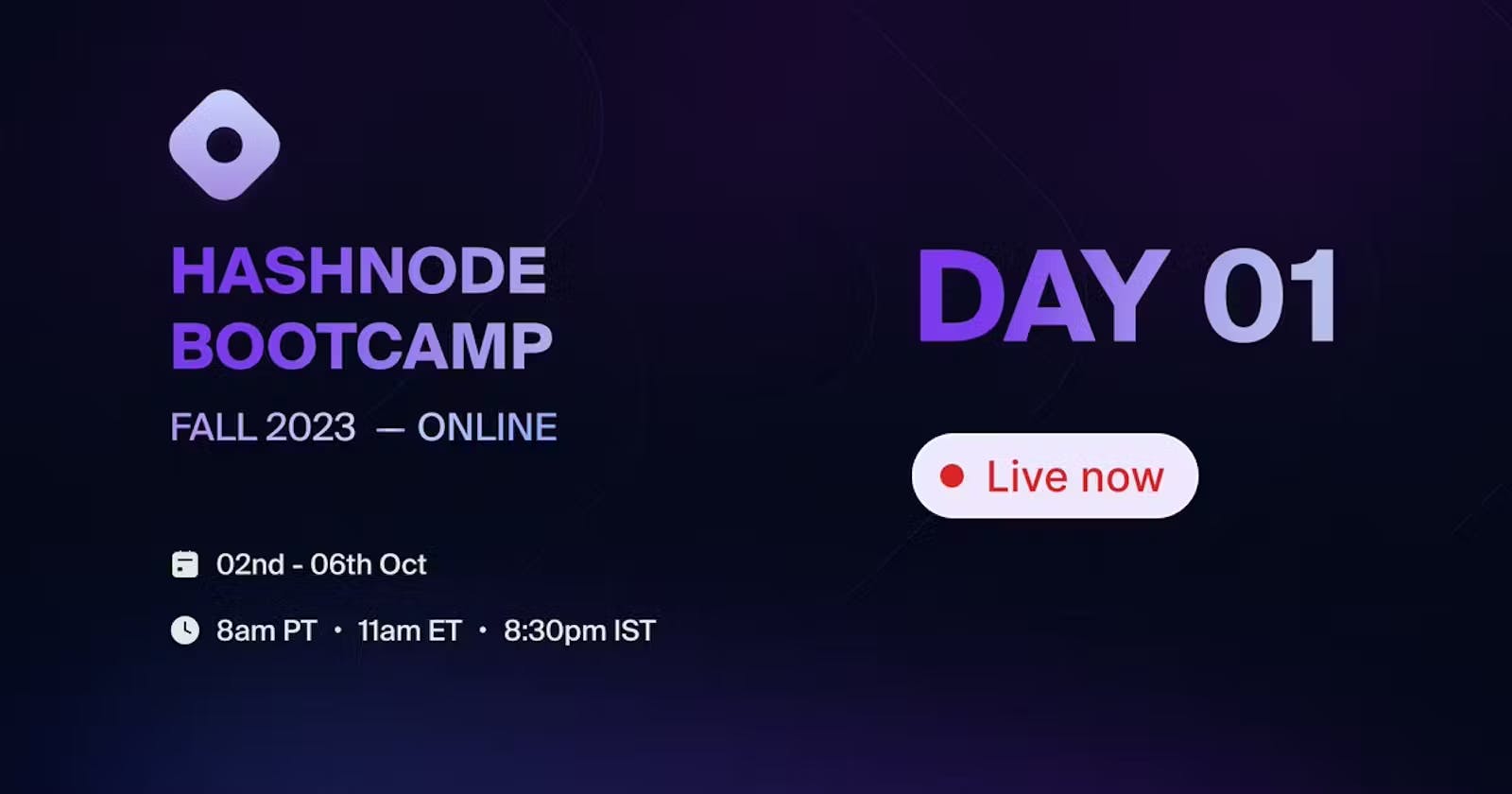Table of contents
- Welcome and Introduction to the Hashnode Bootcamp - Dani Passos (Developer Relations Lead at Hashnode)
- Session 1: Building Connections in Open Source: Unlocking Opportunities - Rafael Hernandez (Web Developer)
- Session 2: To All Juniors Devs Out There: Building Universe, Not Just Code - Sabrina Aquino(Devrel, Shakudo)
- Conclusion
It came with great delight when I received an invitation to attend the hashnode bootcamp 2023. This was my first time and looking through the agenda and the speakers who were going to be speaking, I was hyped up and couldn’t wait to get started. In this article, I will be sharing everything I have learned from these amazing speakers. So dont go too far.
Welcome and Introduction to the Hashnode Bootcamp - Dani Passos (Developer Relations Lead at Hashnode)
The session started with Dani welcoming everyone and introducing us to the bootcamp agenda. She took her time to get familiar with the participants' expectations.
Session 1: Building Connections in Open Source: Unlocking Opportunities - Rafael Hernandez (Web Developer)
Rafael’s session was focused on how easy it is to make connections through open source compared to other channels such as social media. The unique thing about open source is that people with whatever skill can contribute to open source and gain the benefits. These benefits might not be easy to find elsewhere.
Rafael’s open-source journey started when he contributed to the freecodecamp version 7 curriculum. This made him establish a connection with Quincy Larson, the founder of freecodecamp. Quincy invited Rafael to translate the curriculum into Spanish, where he subsequently assumed the role of leading the translation team.
Key Learnings From The Session
Learn the concept - Pick Up What They Put Down. Build connections by engaging with contributors and experts in your local community. When questions are posted, try to give feedback and share insights. Do not be shy to ask questions.
Join a community and ensure you are giving back to the community and not just receiving. Make it mutual.
Leverage open source community. He recommended The Eddie hub community.
Share your contributions on social media. Someone might be interested in what you are doing.
Looking for projects to contribute to? Look into Github. There are lots of projects there.#
Create an issue on GitHub. Do not wait for one.
You do not need to be an expert to contribute. Look for a project that matches your current stack. Remember, there is always something for you.
You will never know you are ready to contribute to open-source if you do not take the first step. Your soft skills can be an indicator that you are set to contribute.
Session 2: To All Juniors Devs Out There: Building Universe, Not Just Code - Sabrina Aquino(Devrel, Shakudo)
For most participants, this was the most captivating and interesting session. This session focused on junior devs but was packed with insights that mid and senior devs can find useful.
Sabrina started by stating that getting into the tech industry is no longer as easy as it was some couple of years ago. Companies now request juniors to be masters of different technologies before they can be employed.
Also, she mentioned how programmers are becoming worse. A lot of content might be confusing and superficial. There are many abstractions on these tutorials and consuming them makes devs hollow.
The industry is more sophisticated than it once was. You will need to compete in the current market. This illustration below describes the sophistication layers and how deep you may need to learn to compete in the current job market.

Key Learnings From The Session
It is okay to learn the latest technologies. First, know what problems it solves and why you should learn them.
Learning the foundations effectively makes it easier to switch to another technology in the future.
Understand the abstraction layers of a technology. Be curious to know how it works.
To deal with deadlines, understand the complexities of the project, and report to your superiors. Make a detailed report on the work and time spent at all stages.
Google is always your best bet in exploring a framework/language/library and knowing if it is best for your next project.
Discover what the companies in your local community are looking for and try to fit in.
There are a lot of resources. Choose content creators that you trust. Apply the things that you are learning and build with it.
Try to develop complex applications independent of the tech stack. You can think of a project, find the technologies needed to build it, learn them, and then start building the project.
Conclusion
The first day was incredibly wonderful. Listening to these sessions I attended gave me more insights into the tech world. While Rafael emphasized how open source is the building of connections as a developer and how leveraging the community can be a booster to your career, Sabrina talked about the challenge junior devs are facing in the job market and how to go about it. I look to future sessions. See you there.
Thanks for reading. I would like to connect with you. Follow me on X(Twitter) and LinkedIn. I would love your comments and feedback. And do not forget to drop a like.
